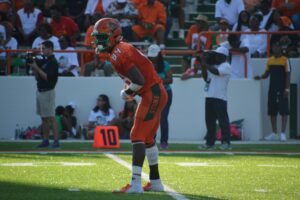
The wail of a mother’s cry is capable of breaking the hearts of millions. To lose a son, a daughter, or simply even a loved one is heart-wrenching.
Sadly, in some cities dressing up in all black to commemorate the life of someone is more common than others. There is a gut-wrenching feeling when you hear gun shots up the street or outside your window, whether it be at night or in broad daylight. It’s a feeling that sadly some of the young and beloved, FAMU student-athletes have had to grapple with.
“My uncle was shot like two months ago, so it really hit home. My experience with gun violence is through my family and my neighborhood,” FAMU football offensive lineman Jalen Brayboy said. “I’m kind of numb to seeing it but i’m more aware. If something looks weird, I try to leave the premises.”
Growing up in this type of environment can shape a person, especially duringadolescence.
“It made me more aware of people and what people are capable of — bullets don’t have names on them,” Brayboy said. “To anyone that’s dealing with gun violence, it’s not your fault, if anything happens to your family members or anything, don’t blame yourself. The best thing to do is get away from it — don’t play with gun violence trying be cool or get revenge, because it hurts you in the end.”
Brayboy is from the north side of Jacksonville.
Wide receiver Chad Hunter, a Tallahassee native, had this to say: “It really takes a toll on the city — everybody knows somebody.”
Most FAMU athletes are between 18 and 22 years old. Hunter, who attended Rickards High School, said guns are part of life on Tallahassee’s south side.
“I’m strong minded, I done been around this since a baby,” he said.
Hunt said he is numb to gun violence. Laron Fryson and Kumasi Kareem were two young men whoHunter regarded as brothers. Sadly, both were victims of gun violence.
“Guns don’t kill people, people kill people,” Hunter said.
Terell Jennings a running back, has also been exposed to gun violence, losing his pregnant sister six years ago when she was only 18 years old.
“Depression wise you think, ‘Dang, I really lost my sister to a gun,’ and at a young age,” he said.“(People can) fight out some problems without getting physical or using a weapon or guns in particular.”
Jennings’ birthday was on Jan. 3. On that same day 18-year-old Malik Brown, a friend to both Jennings and one of FAMU’s track runners, was shot and killed leaving behind his 1-month old daughter. This athlete wanted to remain anonymous for the interview while sharing his experience with gun violence.
“I was 8 years old when I heard gunshots, and I’m like, ‘What is that?’ My dad had told me that point there was no hiding me from the reality of the world I lived in, so I was exposed to it, and seen it ever since,” the track athlete said.“Back in high school, I finished a football game and walking outside I could see someone who had been shot and killed. – It showed me how short life can really be.”
He added: “A gun don’t make you stronger, it don’t make you a man. Anyone can pull a trigger.”